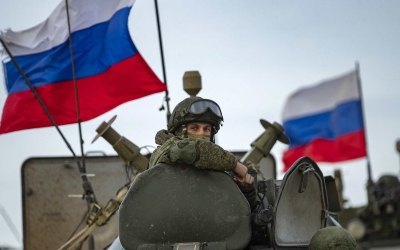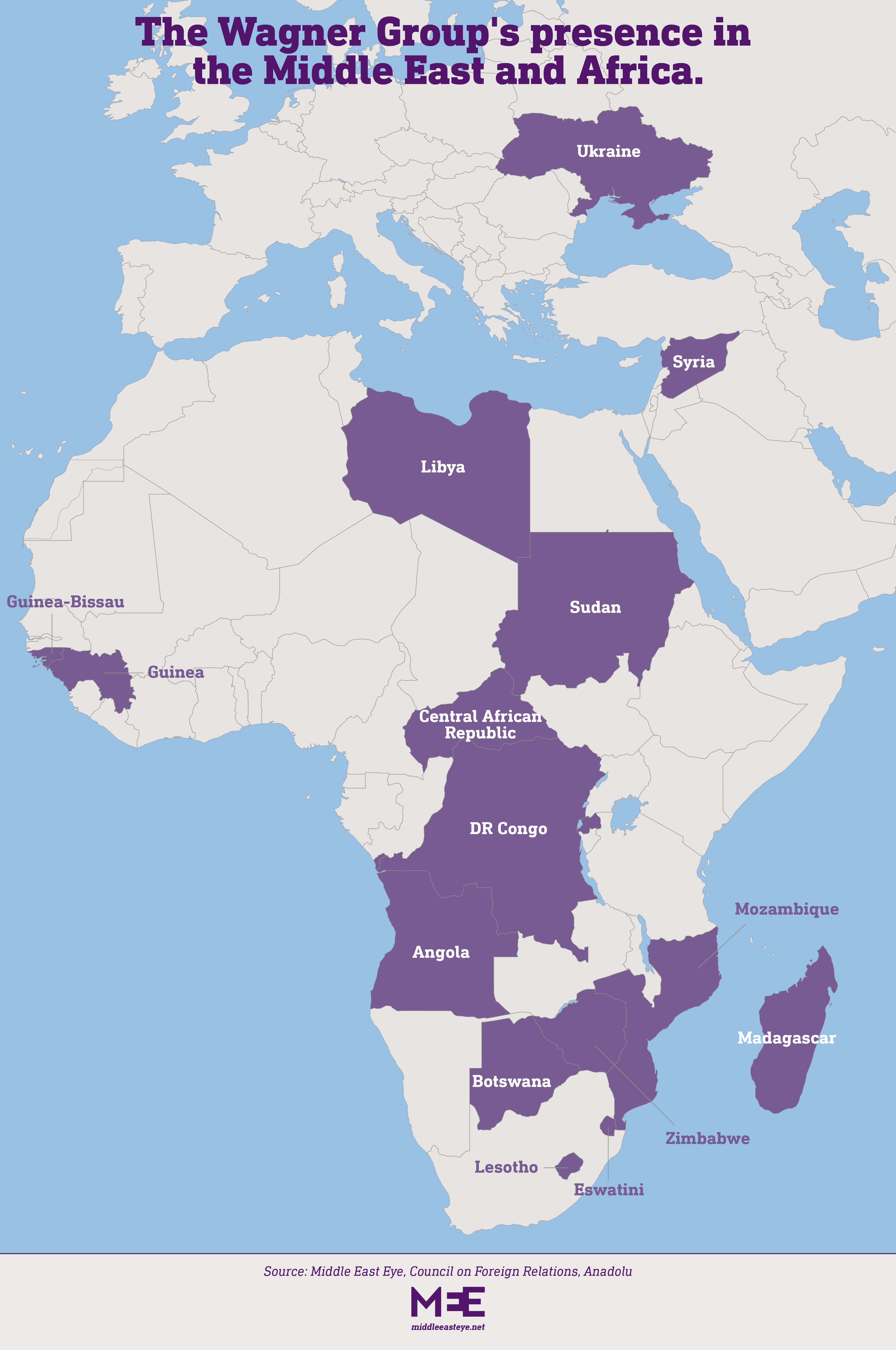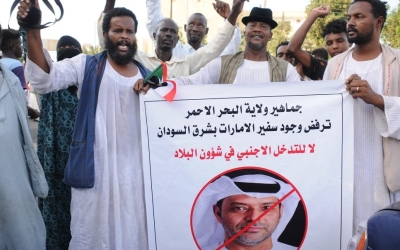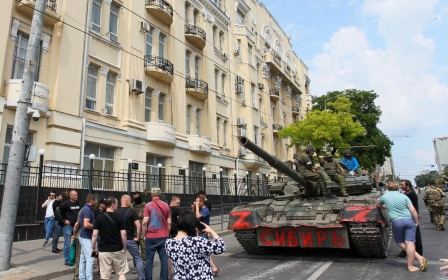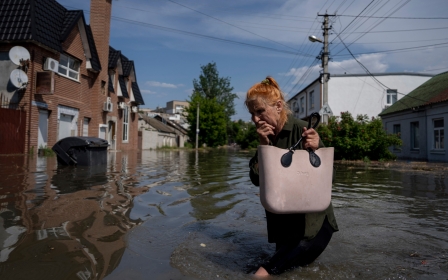Wagner mutiny met with hope and trepidation in countries group is active in
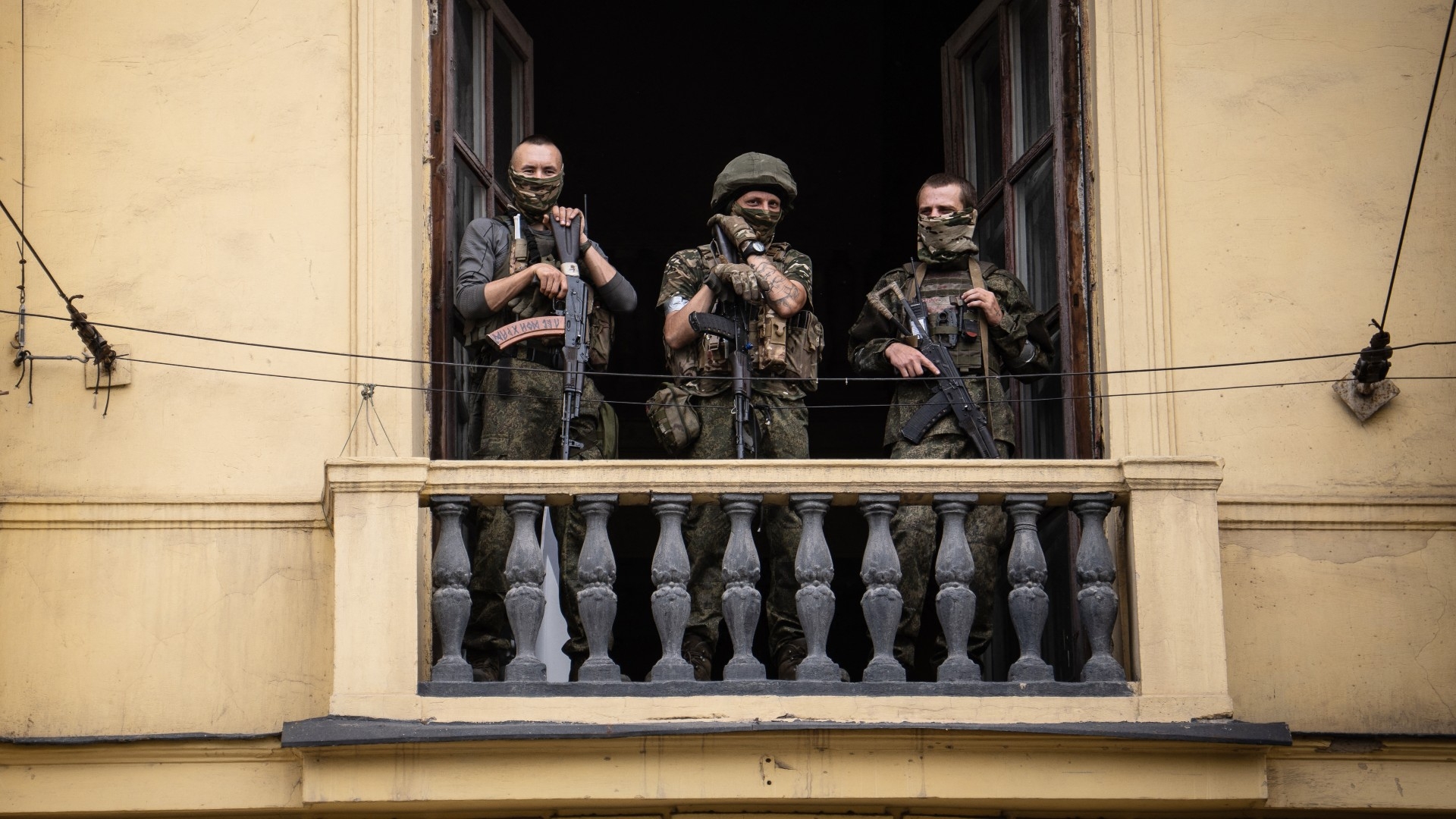
A truce and the apparent exile of a mercenary leader were the end result of a dramatic day in Russia on Saturday, which was closely watched around the world.
Yevgeny Prigozhin, chief of the Wagner Group, lead a short-lived mutiny against leaders in Moscow, stating that his forces had captured army headquarters in Rostov-on-Don in southern Russia.
The fighters had crossed into Russia from Ukraine overnight, and advanced northwards towards the capital Moscow, before Prigozhin called off the rebellion.
It was later announced that the mercenary leader would be exiled to Belarus as part of a truce agreed with Putin and mediated by Minsk.
In an 11-minute audio message recorded on Monday, Prigozhin said he was not aiming to topple Putin, but to hold leaders in Moscow "to account" over "mistakes" made in the Ukraine war.
New MEE newsletter: Jerusalem Dispatch
Sign up to get the latest insights and analysis on Israel-Palestine, alongside Turkey Unpacked and other MEE newsletters
Wagner mercenaries are active in several countries around the world, including in the Middle East and Africa. Over the weekend, officials, media, and activists from those countries reacted to the rebellion as it played out.
Syria
Wagner has been militarily active in Syria since 2015, when its mercenaries were deployed to fight alongside President Bashar al-Assad’s forces.
In 2018, during the "battle of Khasham", US forces engaged with Wagner fighters - in what was one of the only military confrontations between American and Russian forces since before the Cold War. Between 200 and 300 pro-Assad fighters, most of whom were assumed to belong to Wagner, were killed after they assaulted a US outpost in eastern Syria.
In Syria today, one of Wagner’s key roles is to provide security for oil, gas, and phosphate fields in the central and eastern parts of the country.
Speaking to Arabi21, Malik al-Kurdi, a former commander of the Free Syrian Army, said that the fallout could weaken Russia’s military presence.
“This may limit Russia's ability to play the previous role in Syria, and to manage the rehabilitation of Bashar al-Assad's regime, which serves Russia's strategic presence in the region,” he said.
Some Syrian opposition commentators were celebrating the domestic turmoil in Russia.
“Wagner and Putin are two sides of the same coin, war criminals. We are certainly pleased to see the war between them, and that's what we want,” said journalist Nedal al-Amari.
“Wagner and Putin have destroyed Syria and killed thousands of innocent people, just as they did in Ukraine. So damn on both of them. Keep up your war, we are very happy.”
Wagner has been accused of committing several crimes in Syria, including the brutal torture and beheading of a Syrian army deserter in 2017, which was posted in a video online.
Rami Abdurrahman, director of the UK-based Syrian Observatory for Human Rights, said on Monday: “It seems that the Russian forces responded to the Wagner rebellion by killing the Syrian people.”
He was referring to the at least nine civilians killed and over 30 wounded after Russian warplanes carried out air strikes on rebel-held Idlib in northwestern Syria on Sunday.
The attack targeted a vegetable market in Jisr al-Shughour in eastern Idlib, according to the White Helmets, a group of volunteer, civil defenders.
Pro-Assad media was relatively muted on the insurrection, according to Al-Sharq al-Awsat. Al-Watan, a government-aligned daily, spoke of how Prigozhin “shocked the world” by moving against Moscow.
Libya
Wagner’s mercenaries have been a key player in Libya, helping military commander-turned-warlord Khalifa Haftar gain control of the southern and eastern regions of the country.
In late 2020, MEE spoke to people in Libya who had suffered at the hands of Wagner and later detailed the different mines - likely laid down by Wagner - found in civilian areas after Haftar’s assault on Tripoli. At the time, more than 70 civilians, including children, had been killed by blasts.
Adel Abdel Kafi, a Libyan military expert, said over the weekend that the insurrection was an opportunity “presented on a plate of gold” to expel Wagner forces from Libya.
He told Ean Libya that the “situation now allows for a military operation against [Wagner] in Libya,” adding that Libyan commanders and politicians could prevent the mercenaries from maintaining a front on its territory.
Meanwhile, Abu al-Qasim Qazit, a member of Libya’s supreme council of state, said that the fallout would “weaken” Russia.
“If the link between the Wagner Company and the Russian Federation is disengaged, it will weaken and become a prey for the western camp,” he said, referring to the US, France and Britain, in particular.
Qasim Dabarz, another member of the council of state, said the development would inevitably affect Libya, “in a way that may be indirect”.
Separately to the insurrection, Algerian newspaper El-Hiwar reported on Sunday that Haftar had accumulated debts of up to 7bn euros to the UAE and Wagner.
Sudan
Wagner has played a role in Sudan since at least 2019, when they were deployed during the rule of former longtime president, Omar al-Bashir.
The group is now believed to be there primarily in a security capacity to protect resources, namely Sudan’s lucrative goldmines.
US officials believe that in recent months, gold mining concessions operated by Wagner have been partly re-directed towards Moscow's reported $130bn gold stash, helping Putin circumvent the effect of economic sanctions imposed over the Ukraine war.
While Wagner has been close to both sides of Sudan’s current warring factions, the Rapid Support Forces (RSF) paramilitary group and the country’s army, the mercenaries have formed closer ties with the former.
RSF leader Mohamed Hamdan Dagalo, known as Hemeti, flew to Moscow just a day after Russia launched its invasion of Ukraine. According to CNN, Wagner has supplied the RSF with missiles to support them in their fight against the army.
There has been no official comment from either the army or RSF regarding the short-lived insurrection in Russia.
Many commentators took to social media to draw comparisons between the RSF and Wagner.
“Authoritarian governments and military dictatorships really need to stop enabling or creating or outsourcing violence to paramilitaries or [private military companies]” said Mat Nashed, a journalist specialising in Sudanese affairs.
“These entities evolve into having power and interests of their own, which then rival their parents. Learn your lessons already.”
“Whether it’s Wagner, the RSF, or whoever they all follow the same tactics, same trajectory morphing from allies to foes, same style of destruction - the sad part it’s not new it’s been done time & again & the lessons are never learned,” said one former Sudanese journalist.
There was even a meme circulating that showed Wagner forces dancing to Sudanese folk music with the caption, “the Russian janjaweed”, drawing a link between the mercenaries and the militia group the RSF formed out of.
Salah Manaa, an official in the Forces for Freedom and Change (FFC) pro-democracy movement, said that Putin “said no to war” and instead chose peace, which he described as “the choice of the heroes and the brave”.
The tweet was widely ridiculed, with users citing Moscow’s actions in Ukraine. One democracy activist accused Manaa and the FFC of attempting to stop Sudanese people who were “united against the RSF”.
Iran
Iran, which has long been a key ally of Russia, was quick to throw its support behind Putin.
On Saturday, foreign ministry spokesperson Nasser Kanaani described the developments as an internal matter, and added that Tehran “supports the rule of law in the Russian Federation”.
Foreign Minister Hossein Amirabdollahian told Sergei Lavrov in a phone call that he denounced any foreign interference in internal matters, according to the semi-official Tasnim news agency.
Esmaeil Kousari, an Iranian lawmaker and former IRGC general, told Didban Iran that the insurrection was the work of foreign influences.
"Certainly, the westerners have their infiltrators among these forces. The West uses them to weaken the Russian front in the war against Ukraine, but this will inevitably harm the West's position," he said.
'It is naturally clear that Putin cannot have a stable future'
- Heshmatollah Falahatpishe, Iranian politician
He added that he did not think the brief rebellion would weaken Putin.
However, lawmaker and foreign policy committee member Heshmatollah Falahatpishe told the same outlet that he believed the Russian president had lost power.
"It is naturally clear that Putin cannot have a stable future," he said. “We are going back to the [Boris] Yeltsin period," referring to Putin’s embattled predecessor.
"Putin has learned all of [philosopher Niccolo] Machiavelli's lessons well, except for one part,” Falahatpishe added. "With mercenary forces, basic military objectives cannot be advanced."
Meanwhile, Iranian dissidents and activists celebrated the civil strife in Russia.
“Dictators fall, regimes are overthrown, freedom is achieved. Don’t believe the naysayers. Keep doing what you think is right,” said Alireza Nader, from the National Union for Democracy in Iran.
Amer Taheri, a former Iranian newspaper editor, addressed Ayatollah Ali Khamenei in a tweet, stating: “If you hoped Vladimir Putin will rush to rescue your ramshackle regime in a time of crisis as he did for Bashar al-Assad in Syria, think again.”
Central African Republic and Mali
Wagner is reportedly active in several African countries, including Mozambique, Madagascar, Mali, and the Central African Republic (CAR).
In Mali, the military rulers who took power in a coup in 2021 have worked closely with the Russian mercenaries.
The United Nations working group on the use of mercenaries has called for a probe into alleged Wagner and Malian government abuses committed in the country, including executions, sexual violence, and enforced disappearances.
Meanwhile in the CAR, Wagner contractors serve as part of the security detail to President Faustin-Archange Touadera. There are 1,890 “Russian contractors” in the African country. They are believed to have access to diamond, gold and timber contracts in return for their security support.
On Sunday, the Daily Beast reported that CAR officials were worried that the face-off between Putin and Prigozhin could end Wagner operations in the country.
“The Russians play a very important role in the security architecture of our country, and if they are forced to pull out completely, things could become messy,” an advisor to Touadera said.
Mali’s military rulers were also concerned about the future of Wagner’s involvement in their country, according to the Daily Beast.
Middle East Eye delivers independent and unrivalled coverage and analysis of the Middle East, North Africa and beyond. To learn more about republishing this content and the associated fees, please fill out this form. More about MEE can be found here.


